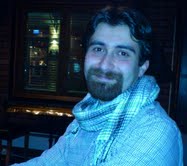
By Ramyar Hassani:
On June 14, 2013 another presidential election was held in Iran and a new president elected. But this time, different to the last election in 2009, without any kind of riot, clashes, protest or objection. Lots of people, embellished with violet ribbons, even came out happily onto the streets on June 15, celebrating their good fortune and the power of their votes.
The new president, Hassan Rouhani, is a mullah educated at an international university who speaks English. Smiling differently than Mahmoud Ahmadinejad, he said nothing about wiping Israel from the map and he mentioned U.S.-Iran dialogue in a more diplomatic way. He spoke out, as he did during his campaign, against those responsible for the current situation of the country, saying they are not welcome anymore by the people. He seems some kind of moderate president, compared to Mahmoud Ahmadinejad, but he is still obedient to the supreme leader who is the last filter on crucial decisions.
Mahmoud Ahmadinejad represented the Islamic Republic regime of Iran in a slangy and vulgar manner which was not effective diplomatically. It created lots of problems for the country as well as pushing Iran into more isolation. By contrast, Rouhani looks like a better option to make it easier for the supreme leader and Islamic Revolutionary Guards Corps (IRGC) to deceive the international community about the reality of the regime.
Rouhani has not yet begun his term as president and it is not easy to analyze his agendas, strategies or even his personality. What is clear is his past record as he was one of the closest advisers to Ayatollah Khomeini and served two stints as national security adviser, from 1989 to 1997 and 2000 to 2005, and he was Iran’s chief nuclear negotiator from 2003 to 2005. Of course he is not a reformist but in reality a part of both the conservative and national security establishments.
The supreme leader and IRGC needed someone to balance and repair foreign relations, calm down internal issues and control people, this time with less repression, to gain their trust in the president. The regime also had to find a way to achieve consensus without openly cheating the people of Iran.
At one of Rouhani’s election rallies, on June 8, the participants chanted, “Political prisoners must be released” and then they came onto the streets to march to Rouhani’s campaign center, until security forces intervened and arrested several people.
Also, in one of his speeches Rouhani said that, “While the centrifuges are working, the country should also be working”. This gave people hope that their excruciating lives, due to the nuclear project, will end or at least lessen under Rouhani.
Hassan Rouhani, in his speech in Jamaran, announced: “This year will not be as same as 2009”. This meant he was sure that he would become the president and this confidence must have been given to him by someone such as Ayatollah Khamenei.
If Ayatollah Khamenei and the IRGC had wanted to give the presidential position once more to the conservatives then they could easily have asked some of those candidates to stand aside and have just one conservative candidate, making it very hard for Rouhani to win. But the preferred scenario was to let Rouhani win the election and let voters to feel prospered and proud of the power of their ballots while the regime prospered again and the people are deceived.
Oppressed and repressed people in intolerable life conditions mostly choose between worse and bad or even between worst and worse, in the hope of finding a better life and relief. But most of the time this is just a mirage used by the dictatorial regime for their own benefit to govern the country for longer and longer while the people wait quietly.
In his first press conference, Hassan Rouhani said the same things as previous presidents such as Mahmoud Ahmadinejad, but more diplomatically and calmly and with more smiles. However, he said nothing about releasing the green movement leaders – Mir Hossain Mousavi, Zahra Rahnavard and Mehdi Karoubi- even though this was one of the main requests of most of his voters. He just ignored this topic even with some remonstrance at the end of the press conference.
What difference will the election mean for Kurds as a minority inside Iran? Is there a difference between Rouhani and Ahmadinejad for Kurds? Of course there is no difference between them nor any other former presidents – including reformists, conservatives and moderates – because, ever since the triumph of the Islamic revolution in Iran and until now, Kurds have been considered as separatists who act in support of enemy governments. They have been deprived of their basic rights as human beings, accused of enmity against god and of acting against national security, sentenced to imprisonment and death and the Kurdish political parties in exile have been declared by the regime to be illegal and disbanded.
Therefore the problem for Kurds is the regime and not a person who is obedient of the supreme leader and sits behind the presidential desk. The new president will not make major changes on Kurdish issues.
Consequently in a regime which there is a perpetual supreme leader with omnipotence and the backing of the Islamic Revolutionary Guards, electing a new president is not going to make major changes. All major changes and important decisions must receive a green light from the Ayatollah Khamenei. The president is one of his submissive people because the supreme leader filters the presidential election candidates through the guardian council.
Ramyar.hassani@gmail.com
Copyright © 2013 Kurdistantribune.com
.jpg)


